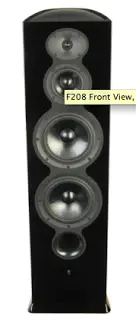 |
| Revel’s Speakers have a reputation for measuring well in various environments |
Over the years, there are several reviewers that I’ve enjoyed reading: Michael Fremer, Thomas J. Norton, Kris Deering, John Atkinson, Steve Guttenburg, Scott Wilkinson, to name just a few I’ve read and followed over the years. To that list I’d also add Brent Butterworth, who is the subject of my post.
I recently blogged about one of Brent’s articles in Sound and Vision Mag where Brent covered the problem of acoustical measurements done outside the context of an anechoic chamber. I’ve always found it funny that certain individuals in forums will take great pains to show certain curves that they measured in their own room to put forth how a speaker’s response is. Brent did a wonderful job of exposing the differences you get by measuring the exact same speaker in an anechoic chamber, in a room, and outside in a quasi-anechoic environment.
Well, Brent takes aim once again at the forum folks—and this time on the topic of headphones—on the timely topic of “Who’s to say what ‘accurate’ is?”. I found the story on Revel’s web site. As a disclaimer, I’m a particularly big fan of Revel because I’ve followed the research done by Dr. Floyd Toole and Dr. Sean Olive and I follow Dr. Olive’s blog every now and then. If you’re serious about audio stuff then you owe it to yourself to download the audio software from Dr. Olive’s blog that will help you become a better listener. But I digress…
Brent’s article covers the topic of accuracy. Haven’t you heard it said, this speaker is “accurate”? Well how on earth do we know what accurate is because, as Brent rightly points out, none of us was there in the mixing studio when things were performed. All recordings are done on microphones with emphasis or deemphasis in certain frequencies, monitoring was done on different speakers or headphones, etc. etc. etc. All this discussion came up in the context where a forum poster criticized Brent and others on a panel because they didn’t choose the inexpensive, Monoprice headphones in a headphone shootout. By inexpensive, we’re talking about $7.65 for the Monoprice 8320.
The criticism Brent and the other reviewers had on the Monoprice headphone was that it lacked bass and sounded a bit bright. One anonymous forum poster criticized the review panel by claiming that the Monoprice headphones were “accurate”.
Brent sums it up in a very simple sentence, “Thus, we’re using inaccurate recordings to judge the accuracy of an audio component.” Headphones, especially as Dr. Olive has shown in his own research, are among the most difficult things to measure for a variety of reasons.
As audiophiles we do indeed need to be very careful with the terminology we use. I’d even go one step further and use the term “throw around”. It’s so easy—especially in forums to see opinions and perspectives thrown around. Some state their perspectives with force as gospel-truth using absolute terms and squashing any contrary perspective.
If there’s any lesson that I’ve learned reading Dr. Toole’s book and some of his other papers over the years is how difficult the science behind good sound is and how easy it is for us non-psychoacousticians to get it just plain wrong. I don’t mind it when people have opinions and perspectives when it comes to audio and equipment. It’s certainly appropriate to frame conversations in the context of personal tastes or personal opinions but please, the next time someone thinks they know what “accurate” is, please publish a white paper on it and put some data behind those absolute conjectures. Oh, and don’t forget that acoustical white papers aren’t authored by “Anonymous”.











